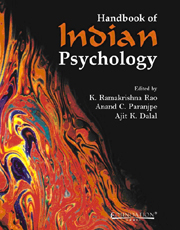Book contents
- Frontmatter
- Contents
- Contributing Authors
- Preface
- 01 Prologue: Introducing Indian Psychology
- 02 Indian Thought and Tradition: A Psychohistorical Perspective
- PART I SYSTEMS AND SCHOOLS
- PART II TOPICS AND THEMES
- PART III APPLICATIONS AND IMPLICATIONS
- 24 Therapeutic Psychology and Indian Yoga
- 25 Towards an Indian Organizational Psychology
- 26 Research on Indian Concepts of Psychology: Major Challenges and Perspectives for Future Action
- 27 Meditative Traditions and Contemporary Psychology
- 28 Consciousness Evolution of the Buddha until He Attained Satori
- 29 William James on Pure Experience and Samādhi in Sāṃkhya Yoga
- 30 Sri Ramaṇa Maharshi: A Case Study in Self-Realization
- 31 Altered States of Consciousness and the Spiritual Traditions: The Proposal for the Creation of State-Specific Sciences
- Pronunciation and Transliteration of Sanskrit Alphabet
- Glossary
- Index
26 - Research on Indian Concepts of Psychology: Major Challenges and Perspectives for Future Action
from PART III - APPLICATIONS AND IMPLICATIONS
Published online by Cambridge University Press: 26 October 2011
- Frontmatter
- Contents
- Contributing Authors
- Preface
- 01 Prologue: Introducing Indian Psychology
- 02 Indian Thought and Tradition: A Psychohistorical Perspective
- PART I SYSTEMS AND SCHOOLS
- PART II TOPICS AND THEMES
- PART III APPLICATIONS AND IMPLICATIONS
- 24 Therapeutic Psychology and Indian Yoga
- 25 Towards an Indian Organizational Psychology
- 26 Research on Indian Concepts of Psychology: Major Challenges and Perspectives for Future Action
- 27 Meditative Traditions and Contemporary Psychology
- 28 Consciousness Evolution of the Buddha until He Attained Satori
- 29 William James on Pure Experience and Samādhi in Sāṃkhya Yoga
- 30 Sri Ramaṇa Maharshi: A Case Study in Self-Realization
- 31 Altered States of Consciousness and the Spiritual Traditions: The Proposal for the Creation of State-Specific Sciences
- Pronunciation and Transliteration of Sanskrit Alphabet
- Glossary
- Index
Summary
In India, psychology as a science, is a century old. Since its inception in 1905, considerable research has taken place. However, the volume of research is not comparable to the amount of research conducted in developed countries. Lack of state and private funding for research in psychology, inadequate avenues for publishing research data, reduced motivation of psychology graduates and mentors may have led to low research publication from India (Manickam, 2003). When the volume of published psychological research literature is evaluated, it is seen that the number of research studies conducted in India focusing on Indian concepts by Indian researchers is considerably low (Manickam, 2002). In this chapter some of the obstacles in conducting research on Indian concepts, the conflicts that have struck the researchers and the means to overcome these obstacles are delineated and guidelines for future action are discussed.
Indian Concepts and the Research Scenario
In psychology, from the time of James (1902) and Jung (1933) onwards, there were references to concepts from Indian thought. Since that period, some of the concepts have been kept alive in some way or the other in the development of psychological science. Kilby (1968) made valuable observations regarding the potential of the Indian concepts, which he termed as the “philosophical psychology in India”. Walsh (1988) focused on some of the important concepts in Indian thought that have significant role in developing a comprehensive psychological science. These writings inspired many researchers to explore Indian concepts from a Western psychological perspective. Indeed, published research literature on Indian concepts in relation to psychology and mental health are more from developed nations than from India.
- Type
- Chapter
- Information
- Handbook of Indian Psychology , pp. 492 - 505Publisher: Foundation BooksPrint publication year: 2008
- 6
- Cited by

